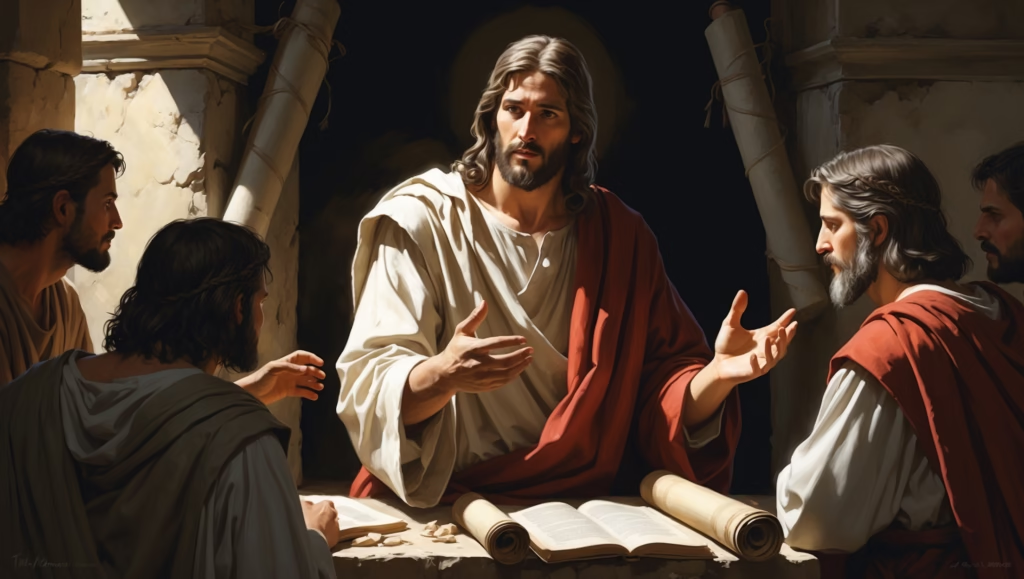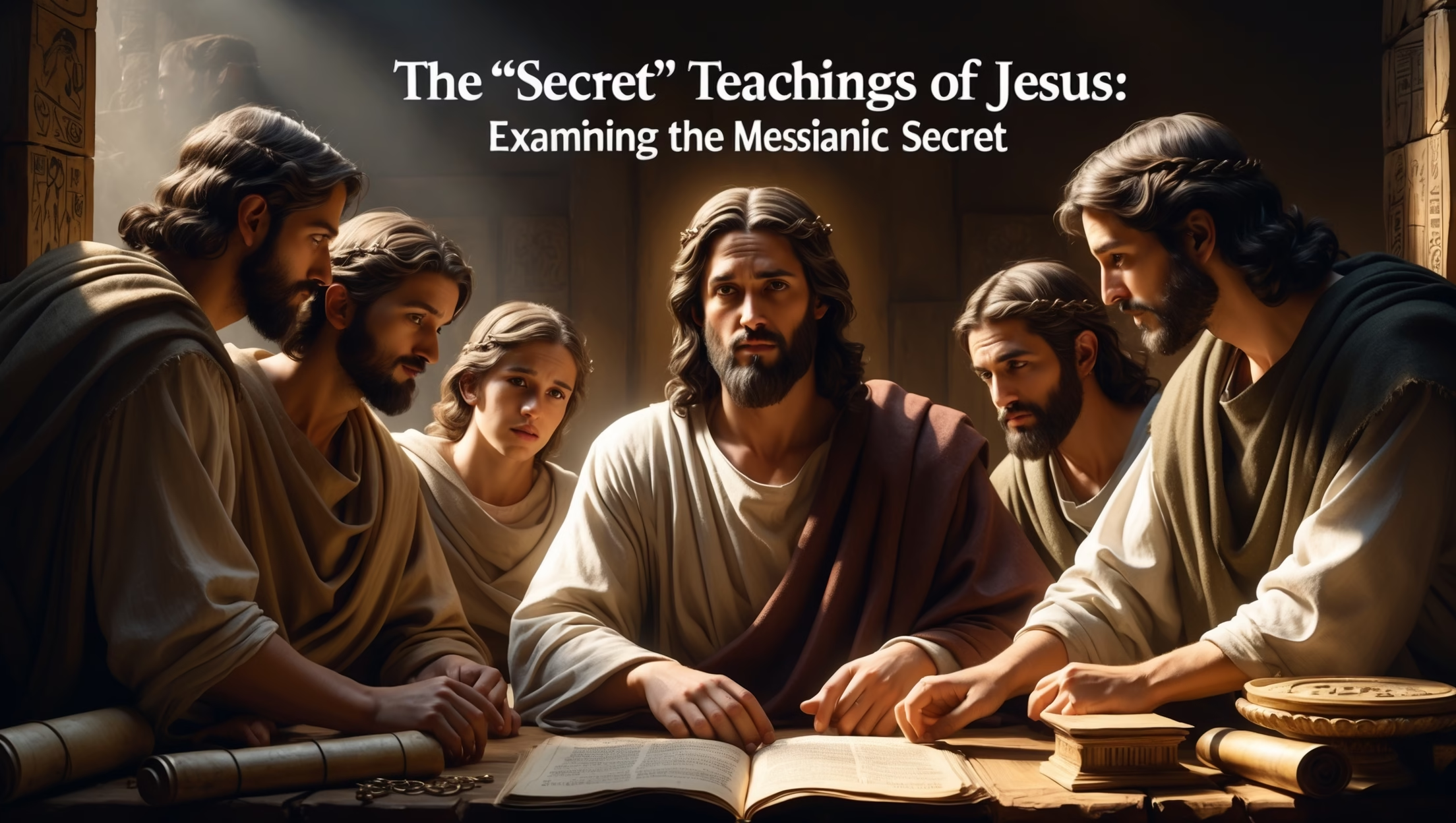Why Jesus Silenced Demons and Disciples
Throughout the Synoptic Gospels, a curious motif emerges: Jesus frequently instructs those He heals—or even His closest followers—not to reveal His identity. This recurring pattern is often referred to as the Messianic Secret. At first glance, it seems paradoxical. Why would the Messiah, whose mission is to reveal God’s kingdom, insist on secrecy? A closer examination suggests that these silences were deliberate, strategic, and deeply theological. They reveal insights into Jesus’ ministry, His understanding of human readiness for revelation, and the broader socio-political context of first-century Judea.
Understanding these silences illuminates Jesus’ mission, His method of teaching, and the theological priorities that would shape the early church. The Messianic Secret demonstrates that revelation is not always immediate, and that knowledge of divine truth carries responsibility.

Key Biblical Texts
Silencing After Healings
One of the earliest examples of the Messianic Secret occurs immediately after Jesus heals a leper. Mark 1:44 records, “See that you say nothing to anyone.” The healed leper naturally wants to spread news of this miraculous restoration, yet Jesus prioritizes discretion. Scholars argue that this is not merely prudence; it is a form of narrative and spiritual pedagogy. By controlling how and when His identity is revealed, Jesus ensures that His ministry is not misunderstood as purely miraculous spectacle or political rebellion.
Healing was deeply public in first-century Judea, often performed in marketplaces or along roads. The potential for sensationalism was enormous. By instructing silence, Jesus shifts the focus from awe at miracles to the deeper truths they signify: God’s kingdom is breaking in, and faith, not spectacle, is central.
Peter’s Confession and Delayed Revelation
Another striking example is Peter’s confession of Jesus as the Messiah (Mark 8:29-30). Immediately after this acknowledgment, Jesus warns the disciples not to tell anyone. The timing is critical. At this stage, the full nature of His mission—suffering, death, and resurrection—has not yet been disclosed. Premature announcement could have led to misinterpretation, or even to political entanglement with Roman authorities.
The Messianic Secret, therefore, functions as both narrative tension and spiritual instruction. Discipleship is not simply about recognizing titles or facts; it is about understanding, internalizing, and living out the implications of Jesus’ identity.
Silence Toward Demons
Jesus’ command of silence extends even to spiritual entities. When casting out demons, He often forbids them from speaking (Mark 1:34; 3:11-12). These incidents emphasize that revelation is controlled and purposeful. Even supernatural recognition of His authority is not to be exploited or sensationalized. This mirrors the broader theme of measured revelation and underscores the importance of discernment in understanding divine activity.
Theological and Historical Theories
Avoiding Political Uprising
One of the most cited reasons for the Messianic Secret is political prudence. Judea under Roman occupation was volatile. Messianic claims could provoke rebellion or Roman crackdowns. By keeping His identity discrete, Jesus minimized risk to His followers and maintained focus on spiritual transformation rather than armed revolt.
This secrecy also challenged popular expectations of the Messiah. Many anticipated a conquering king, liberator, or military leader. By controlling public perception, Jesus could redefine messiahship on spiritual rather than political terms, emphasizing service, sacrifice, and moral authority over power and domination.
Anti-Gnostic Measures and Theological Preservation
Scholars also suggest that Gospel writers employed secrecy motifs to counter early heterodox interpretations, including proto-Gnostic teachings. The “hidden” aspect of Jesus’ identity reinforced that understanding the Messiah required relational commitment rather than esoteric speculation. Revelation was not simply informational; it was transformative.
In this sense, the Messianic Secret safeguards the theological core of Jesus’ ministry, emphasizing faith, obedience, and discipleship as the pathways to truth. It is a countermeasure against superficial knowledge or misuse of miraculous acts.
Discipleship as Deep Knowledge
The Messianic Secret highlights the depth and relational nature of discipleship. Knowledge of Jesus’ identity is not to be taken lightly; it carries responsibility and requires maturity. Jesus’ incremental disclosures teach patience, attentiveness, and obedience. The path to understanding is relational and experiential, demanding engagement with His teachings, actions, and the unfolding revelation of the kingdom of God.
Modern Parallels
Hidden Knowledge and Conspiracy Culture
In contemporary society, the motif of hidden or secret knowledge resonates in many ways. Conspiracy theories, secret societies, and “insider knowledge” all capture modern fascination with revelation and mystery. The Messianic Secret challenges the assumption that all truth should be public and immediate. Some knowledge, particularly transformative spiritual truths, must be approached responsibly, patiently, and relationally.
Spiritual Formation and Catechetical Practice
Christian traditions continue to reflect this measured approach to revelation. Catechisms, baptismal instruction, and spiritual mentorship all mirror the gradual revelation seen in Jesus’ ministry. Learners are not simply given information; they are guided through stages of understanding, growth, and application. The Messianic Secret exemplifies this principle centuries before formal catechetical systems developed.
Cultural and Narrative Functions
Literary Strategy
Beyond theology, the Messianic Secret serves as a literary device in the Gospels. It builds suspense, contrasts public misunderstanding with private insight, and highlights the disciples’ gradual comprehension. Readers experience tension between what they know, what the characters know, and what is revealed in due time.
Psychological and Pedagogical Impact
The repeated commands to silence also model humility and restraint. Followers learn that faith is not about broadcasting miraculous acts or claiming authority prematurely; it is about internalizing truth and responding faithfully. Jesus’ silences function as spiritual training, encouraging reflection, obedience, and discernment.
Key Insight: Revelation with Responsibility
The Messianic Secret reminds modern believers that revelation is rarely instantaneous or universally accessible. Knowledge of Christ’s identity comes with responsibility, requiring discernment, patience, and relational engagement. By controlling when and how His identity was revealed, Jesus teaches lessons about timing, spiritual readiness, and the nature of faith itself.
The secrecy in His ministry underscores that faith is not simply intellectual acknowledgment but relational trust, lived commitment, and disciplined obedience. Understanding this forgotten dimension helps contemporary readers appreciate the strategic, pedagogical, and theological sophistication of Jesus’ ministry.








